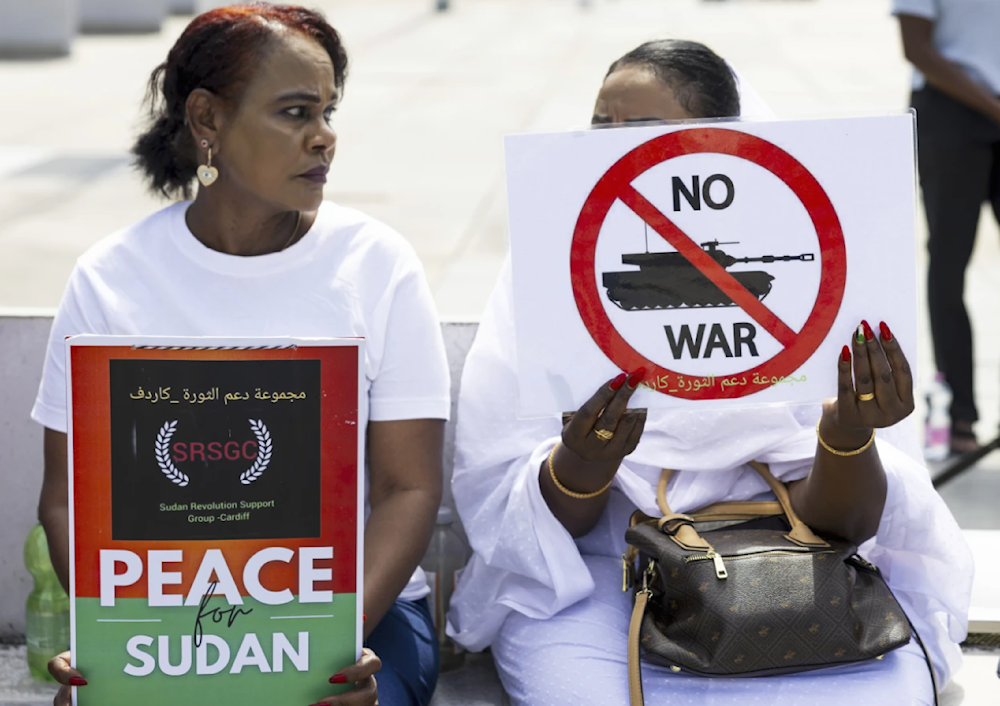Sudan sending delegation to Cairo to meet US and Egyptian mediators
The RSF is joining US-led discussions aimed at bringing an end to the catastrophic conflict that began in April 2023.
-

Demonstrators hold signs during a rally on the opening day of peace talks for Sudan, at the Place des Nations in front of the European headquarters of the UN in Geneva, Switzerland on August 14, 2024 (AP)
Sudan's leadership said on Monday that it will send a team to Cairo to meet with US and Egyptian officials, leaving the possibility of participating in peace negotiations to end a 16-month war.
Previous rounds of talks in Saudi Arabia's city of Jeddah produced no substantial results. Instead, the SAF became firmer in its rejection of a ceasefire with the RSF as the war extended.
Earlier in July, al-Burhan stressed that the SAF would not succumb to the mediators' will and negotiate a ceasefire with the RSF.
According to a statement from the ruling Transitional Sovereign Council, the decision to travel to Cairo was made following discussions with the US special envoy and the Egyptian government, an observer to the talks, and was limited to discussing the implementation of the Jeddah agreement, which requires the RSF to leave civilian areas.
According to high-level government sources, the government has given its view on that and other issues to US and Saudi mediators, and its approach to future negotiations would be determined by their responses.
The sources disputed media rumors that the administration had already dispatched a delegation to Geneva.
Another area of contention for the army is the presence of the United Arab Emirates, which it accuses of arming the RSF.
The army said on Thursday that it would enable an RSF-controlled border crossing into Darfur to be utilized for relief delivery, preempting a crucial theme of the discussions.
A senior US official, commenting on the condition of anonymity, stated that army head Abdel Fattah al-Burhan consented to the opening during a phone discussion with Secretary of State Antony Blinken the day before.
Sudan: Geneva talks are futile
The Sudanese Ministry of Foreign Affairs reported that, as the Geneva Talks between the US envoy and the Rapid Support Forces (RSF) began, the RSF launched an attack on Wednesday evening targeting Al-Khansa Secondary School for Girls and a primary school in al-Obeid, North Kordofan.
The bombings resulted in the deaths of five civilians and injuries to 30 students.
In its statement, the ministry criticized the Geneva talks, asserting that they have proven ineffective. It accused the RSF of using the talks as a propaganda platform to obscure its on-ground crimes.
The Sudanese Foreign Ministry further stated that "peace cannot be achieved by allowing the militia to evade previous agreements and obligations under international humanitarian law, or by treating those who supply it with long-range artillery, missiles, and drones used against civilians as peace partners."
"Discussing Sudanese issues without the government’s involvement lacks legal basis under international law and the UN Charter," it further stressed.
The statement also noted that "the large-scale protests by Sudanese in Geneva against the manipulation of their will and the legitimization of those responsible for their suffering reflect this stance."
It highlighted the RSF’s intensified attacks, including bombings of residential areas in the Karari district of Greater Omdurman and a missile strike on the Al-Nao Hospital in the City of the Revolution, which resulted in severe injuries to four patients.
The ministry concluded that "these acts of terrorism by the militia on the same day it claims to initiate peace talks underscore the futility of the current Geneva discussions."
It is worth noting that these talks, organized by the United States, commenced on Wednesday in a closed-door setting, with representatives from the Rapid Support Forces (RSF) and delegations from several regional countries, including Egypt, the UAE, and other African nations.
At the time, diplomatic sources in Geneva revealed that the United States had been exerting significant pressure on the Sudanese government, urging it to reconsider its boycott of the ongoing talks that began in Geneva.
Meanwhile, Sudan continues to suffer from accumulating humanitarian crises, including widespread hunger, displacement, lack of medical care, and thousands of deaths among civilians.

 4 Min Read
4 Min Read








